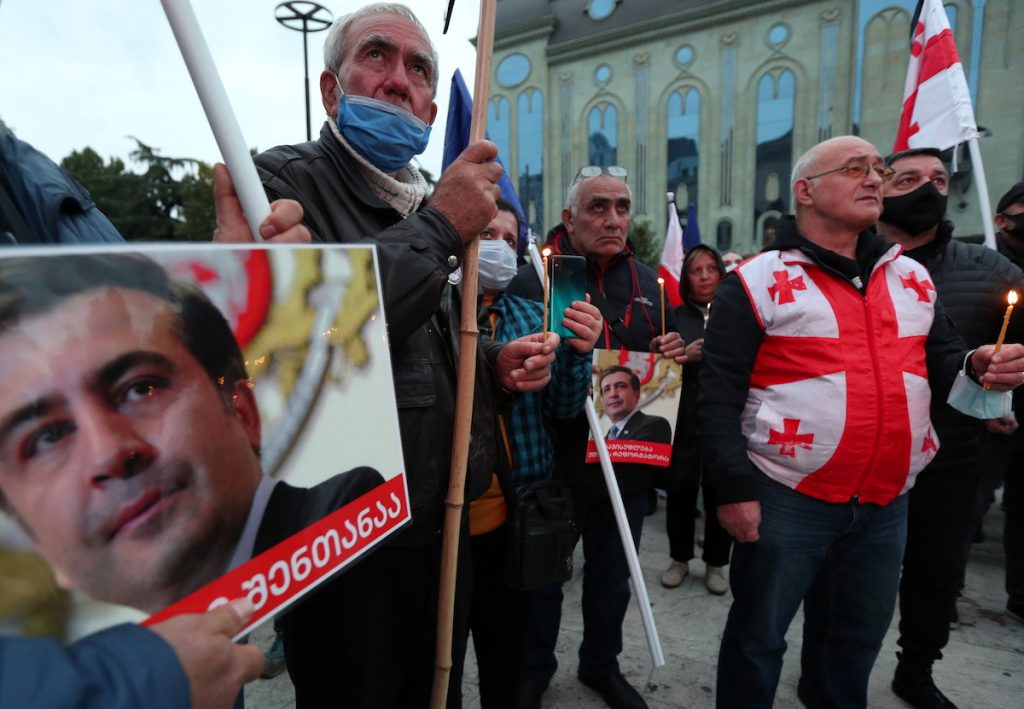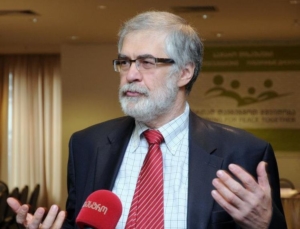Op-ed: Why Saakashvili came and will there be a Georgian Maidan
Gia Nodia commenting on the implications of ex-president Saakashvili’s return
Georgians are quite used to being confused about their politics, but these days, at least according to my personal observations, people are even more uncertain than usual. Everyone is asking themselves – what will happen next? Few claim to have an answer.
We can say with confidence that Mikheil Saakashvili’s sudden arrival on October 1, on the eve of the municipal elections, followed by his arrest the same evening, changed things, including probably the election results, but we cannot say exactly how.
His hunger strike is the main political issue at the moment and it may influence the second round of voting on October 30 – but again, it’s hard to predict, in which way. Besides, who knows what happens between now and then. Whatever I am writing now, may become obsolete in a couple of days.
Now we have three big questions to answer: Why did he come, what did his arrival affect so far, and what will happen now that he is on a hunger strike in prison. I cannot claim to know the answers, but I will address these issues the best way I can.
Why did he return?
His decision to arrive looks like a gesture of hope and desperation at the same time. Apparently, Saakashvili shares a conviction about his special powers: without him, Ivanishvili’s authoritarian regime cannot be defeated.

He has a point there: his party, the United National Movement, is by far the strongest force in the opposition, and the support it gets is largely based on his charisma. On the other hand, the Georgian Dream (GD) is ready to use less than legal means to stay in power, so the opposition may also use some unconventional means of the political fight, which is Saakashvili’s specialty.
Or – as his critics might argue – he does not want the regime to change without him: He has to be in the center of events. Previously, just promising to come and then finding an excuse, not to might had been sufficient to attract attention. But after being repeated several times, the trick (if it was one) could not work anymore.
“Misha is coming” became a joke, and Saakashvili could not afford to be a joke.
His evident calculus was that the very news of his arrival would galvanize people and bring them to the streets, and once he joined the crowd, he would be in his element and relatively safe. What exactly would happen afterward, nobody could say (I don’t think Saakashvili had a very clear scenario either), but things would take some new course.
- From Ukraine to prison: Mikhail Saakashvili returned to Georgia – what next?
- Georgia’s Saakashvili in Ukraine
Certainly, he knew the risk of arrest was great, but he believed it was worth it. He could not stand sitting in Kyiv (or anywhere else) and just posting on Facebook anymore; it was against his temperament and besides, as time passed, his magic could have worn out. He felt he had to act.
How he influenced the elections
The conventional wisdom – which I generally share – is that the fact of Misha’s arrival increased the political temperature and contributed to mobilizing supporters of both his party, the UNM and the ruling one. It is impossible to say whom he helped more; but if we compare election results with the pre-election polls (a procedure that not all Georgians might find reliable), it appears he helped the GD even more than his own party.
Admittedly, he also damaged numerous “third” parties. In these elections, GD and UNM got 77.4% of the vote between them (counting only the proportional part). Last year, the same figure stood at 75.5%.
The direction of change is counterintuitive, because, in the meantime, former prime minister. Giorgi Gakharia’s party emerged and showed about 10% support in the polls; pollsters believed that this party gained most of its support at the expense of the disgruntled GD voters (Gakharia did his best to distance himself equally from the GD and the UNM). Therefore, the “third party” market was expected to expand; in reality, it shrunk even more. In the end, Gakharia’s party got 7.8%; other “third parties” suffered even more, going down to one or two percentage points – supposedly, bleeding their supporters to the UNM.
Historically, when stakes are high, the Georgian voters tend to move to the two major parties; Misha, probably, contributed to raising them. Being a divisive and controversial person, his arrival instilled both hope and fear. The effect of the latter might had been stronger.
What now?
Going on a hunger strike was a way for Saakashvili to embarrass the authorities and further increase the political temperature. But what will actually happen as a result?
There have been protest rallies, and there will be more. A large one is scheduled for October 14th. Mostly, traditional UNM supporters are expected to come, though quite a few others will join, those who may or may not like Saakashvili but believe that he is a political prisoner of Ivanishvili’s regime and that this regime shall go.
Crowds may be larger or smaller, but at the moment, few people appear to expect anything like a Georgian Maidan. I don’t too. But I also know that when it comes to such things, predictions are dicey.
Saakashvili’s main message from prison is not about releasing himself, but about getting out an opposition vote on October 30. The opposition (at this stage, it will be mainly represented by the UNM) has a chance of winning in some cities, and if it does, this will create an important precedent that Georgia has never had before.
In its dominant party system, the party that ruled the country always prevailed on the municipal level as well. A lot will depend on how the supporters of the “third parties” vote: this is another area where predictions are difficult to make.
The Misha factor at stake
What about the longer term? What will happen to Saakashvili the person, the prisoner, and the politician?
There is a feeling of “now or never” in the choices Saakashvili has made these days. What is at stake is not the fate of Ivanishvili’s regime (maybe, that too, though maybe not), but his own political future and reputation. He certainly vindicated himself from the accusations of cowardice. But what about his magic power?
For years, the support for the strongest opposition power largely rested on the faith in it. Misha can do things that nobody else can; his arrival, and nothing short of it, will bring real change. Now he has come and took a great personal risk in doing so. But what will be the result?
We still don’t know, the story is unfolding. But if nothing essential changes, Saakashvili’s political standing in Georgia will never be the same. He knows that too, so he will not give up without a good fight.

Gia Nodia, the head of the Caucasus institute for Peace, Democracy and Development


















